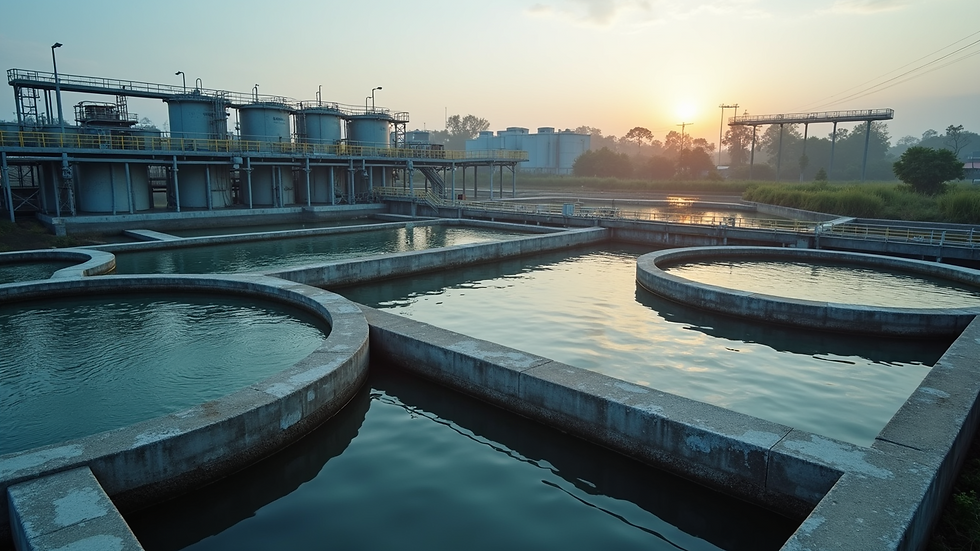Mastering Industrial Wastewater Management in India
- palwinder kaur
- Sep 1, 2025
- 3 min read
Industrial growth in India has been rapid and transformative, but it has also brought significant environmental challenges. One of the most pressing issues is the management of wastewater generated by various industries. Proper treatment and disposal of industrial wastewater are crucial to protect water bodies, public health, and comply with environmental regulations. This article explores effective wastewater treatment methods, the meaning of industrial waste management, and practical strategies to master this critical aspect of sustainable industrial development.
Understanding Effective Wastewater Treatment Methods
Effective wastewater treatment methods are essential for reducing pollutants and ensuring that discharged water meets environmental standards. Industries in India produce wastewater containing harmful chemicals, heavy metals, and organic pollutants that can severely impact ecosystems if untreated.
Some of the most common and effective wastewater treatment methods include:
Primary Treatment: This involves physical processes like sedimentation and screening to remove large solids and suspended particles.
Secondary Treatment: Biological processes such as activated sludge, biofilters, and aerated lagoons break down organic matter using microorganisms.
Tertiary Treatment: Advanced treatment methods like filtration, chemical precipitation, and disinfection remove remaining contaminants, including nutrients and pathogens.
For example, textile industries often use activated sludge processes to degrade dyes and organic pollutants, while chemical plants may rely on chemical precipitation to remove heavy metals.
Implementing these methods requires careful design, operation, and monitoring to ensure efficiency and compliance with regulatory standards.

What do you mean by industrial waste management?
Industrial waste management refers to the systematic control of waste materials produced by industrial activities. It encompasses the collection, treatment, recycling, and disposal of waste to minimize environmental impact and promote sustainability.
In the context of wastewater, industrial waste management involves:
Segregation of Wastewater Streams: Separating hazardous and non-hazardous wastewater to apply appropriate treatment.
On-site Treatment Facilities: Installing treatment plants within industrial premises to treat wastewater before discharge.
Reuse and Recycling: Treating wastewater to a quality suitable for reuse in industrial processes, reducing freshwater consumption.
Safe Disposal: Ensuring treated effluent meets discharge standards to protect water bodies.
For instance, many Indian industries have adopted zero liquid discharge (ZLD) systems, which treat and recycle all wastewater, leaving no liquid waste to be discharged.

Key Challenges in Industrial Wastewater Management in India
Despite advancements, India faces several challenges in managing industrial wastewater effectively:
High Pollution Load: Many industries discharge untreated or partially treated wastewater, leading to severe pollution of rivers and groundwater.
Lack of Infrastructure: Small and medium enterprises often lack access to adequate treatment facilities.
Regulatory Compliance: Enforcement of environmental laws can be inconsistent, leading to non-compliance.
Cost Constraints: High capital and operational costs of treatment plants deter some industries from investing in proper wastewater management.
Technological Gaps: Limited adoption of advanced treatment technologies reduces treatment efficiency.
Addressing these challenges requires coordinated efforts from government agencies, industries, and technology providers.
Practical Recommendations for Mastering Industrial Wastewater Management
To improve industrial wastewater management, industries can adopt the following practical strategies:
Conduct Wastewater Audits: Regularly assess wastewater characteristics and volumes to design appropriate treatment systems.
Invest in Modern Treatment Technologies: Technologies like membrane filtration, advanced oxidation, and bio-electrochemical systems offer higher treatment efficiency.
Implement Process Optimization: Modify industrial processes to reduce wastewater generation and pollutant load.
Train Personnel: Equip staff with knowledge and skills to operate and maintain treatment plants effectively.
Collaborate with Experts: Partner with environmental consultants and technology providers for customized solutions.
Monitor and Report: Establish continuous monitoring systems to ensure compliance and identify issues early.
For detailed solutions and expert guidance, industries can explore resources on industrial wastewater management.

Moving Towards Sustainable Industrial Growth
Sustainable industrial growth in India depends heavily on responsible wastewater management. By adopting effective wastewater treatment methods and embracing innovative technologies, industries can reduce their environmental footprint and contribute to water conservation.
Moreover, government initiatives promoting cleaner production and stricter environmental norms are encouraging industries to upgrade their wastewater treatment infrastructure. Public awareness and community engagement also play vital roles in driving change.
Ultimately, mastering industrial wastewater management is not just about compliance but about safeguarding natural resources for future generations. Industries that prioritize this will benefit from improved operational efficiency, enhanced reputation, and long-term sustainability.
By focusing on practical, actionable steps and leveraging modern treatment technologies, Indian industries can lead the way in effective wastewater management and environmental stewardship.



Comments